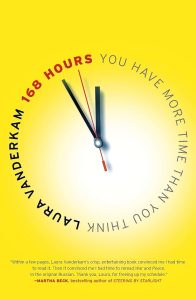 168 Hours: You Have More Time Than You Think
168 Hours: You Have More Time Than You Think
Vanderkam challenges the idea that we are too busy by demonstrating that with proper time management, we can lead fulfilling personal and professional lives within the 168 hours we all have each week. Key Points: Track your time for a week to get a realistic picture of where...
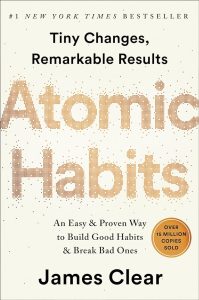 Atomic Habits: An Easy & Proven Way to Build Good...
Atomic Habits: An Easy & Proven Way to Build Good...
Clear explains how small changes in habits can lead to remarkable results over time. Key Points: Make small incremental changes consistently over time to see significant results. Habits are formed by a four-step loop: cue, craving, response, and reward. Create an environment that makes good habits easier and bad...
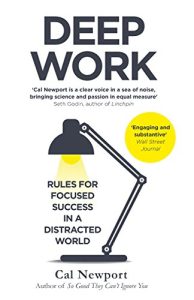 Deep Work: Rules for Focused Success in a Distracted World
Deep Work: Rules for Focused Success in a Distracted World
Newport discusses the benefits of deep work, a state of focused cognitive effort, and how it can lead to significant achievements in a distracted world. Key Points: Schedule time for uninterrupted, focused work to achieve greater productivity. Embrace boredom as a necessary part of the deep work process. Eliminate...
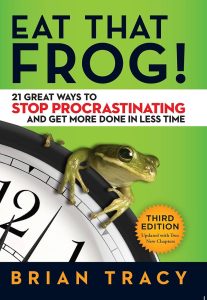 Eat That Frog!: 21 Great Ways to Stop Procrastinating and...
Eat That Frog!: 21 Great Ways to Stop Procrastinating and...
The book is a guide to overcoming procrastination by tackling your most significant and challenging task first. Key Points Prioritize tasks by starting with the most important and difficult ones ("eating the frog"). Develop a habit of completing your key tasks first thing in the morning. Continuously set and...
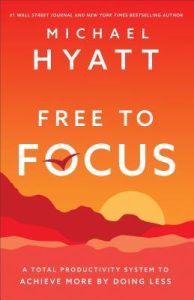 Free to Focus: A Total Productivity System to Achieve More...
Free to Focus: A Total Productivity System to Achieve More...
Hyatt provides a productivity system designed to help readers achieve more by doing less, focusing on the work that matters. -Key Points: Eliminate distractions and automate tasks to free up mental space and time. Prioritize tasks that align with your goals and delegate the rest. Establish boundaries to protect your...
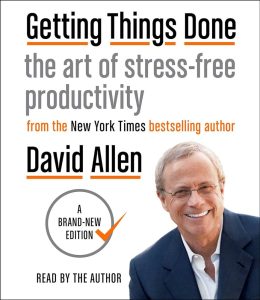 Getting Things Done: The Art of Stress-Free Productivity
Getting Things Done: The Art of Stress-Free Productivity
This book presents the GTD method, a workflow process that aims to provide space for creativity by moving tasks out of the mind and into a systematic external structure. Key Points Capture everything that has your attention in an external system rather than keeping it in your head. Clarify...
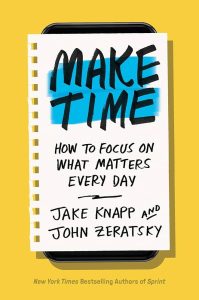 Make Time: How to Focus on What Matters Every Day
Make Time: How to Focus on What Matters Every Day
The authors provide insights on how to break free from the constant busyness and distractions of daily life to focus on what truly matters. Key Points: Highlight your priority each day; ensure it's what you focus on first. Reclaim your time by reducing the number of decisions you have...
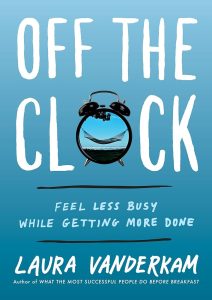 Off the Clock: Feel Less Busy While Getting More Done
Off the Clock: Feel Less Busy While Getting More Done
Vanderkam explores the practices of people who feel less busy while achieving more and enjoying their lives. Key Points: People who feel less busy use their leisure time intentionally, often planning it out to avoid waste. Mindfulness and presence can make time feel more abundant. Being selective about...
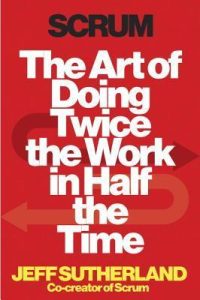 Scrum: The Art of Doing Twice the Work in Half...
Scrum: The Art of Doing Twice the Work in Half...
Extended In-Depth Summary: Jeff Sutherland, one of the inventors of the Scrum software development process, adapts the principles of Scrum for a general audience in "Scrum." The book breaks down how this framework can be applied beyond software to improve productivity in various aspects of work and life. Sutherland demonstrates...
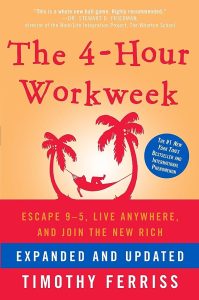 The 4-Hour Workweek: Escape 9-5, Live Anywhere, and Join the...
The 4-Hour Workweek: Escape 9-5, Live Anywhere, and Join the...
Ferriss challenges the traditional work-life balance by proposing that one can escape the 9-5 grind and live anywhere while still making a good income. Key Points: Liberation from the traditional work environment is possible through automation and outsourcing. Define your fears instead of your goals to understand what's holding...
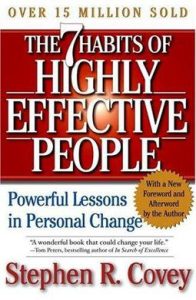 The 7 Habits of Highly Effective People: Powerful Lessons in...
The 7 Habits of Highly Effective People: Powerful Lessons in...
Covey provides a principle-centered approach for solving personal and professional problems. Key Points: Be proactive and take responsibility for your reactions to external events. Begin with the end in mind by having a clear vision of your desired direction and destination. Put first things first by organizing and...
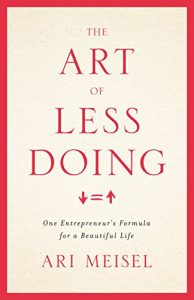 The Art of Less Doing: One Entrepreneur’s Formula for a...
The Art of Less Doing: One Entrepreneur’s Formula for a...
Extended In-Depth Summary: "The Art of Less Doing" is based on Meisel's philosophy that you can create a more effective life by doing less, not more. This is achieved through a framework known as "Optimize, Automate, and Outsource." Meisel explains how you can optimize every task, automate them wherever possible,...
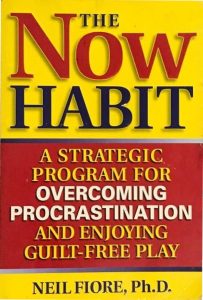 The Now Habit: A Strategic Program for Overcoming Procrastination and...
The Now Habit: A Strategic Program for Overcoming Procrastination and...
Fiore provides strategies to overcome procrastination by promoting the idea of guilt-free play and structured work. Key Points: Procrastination is often a coping mechanism for anxiety about a task. Schedule leisure time first to create a reward and an incentive for productivity. Break tasks into small steps and...
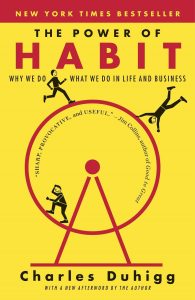 The Power of Habit: Why We Do What We Do...
The Power of Habit: Why We Do What We Do...
Duhigg examines the science behind why habits exist and how they can be changed to create positive outcomes in our lives. Key Points: Habits work in a three-step loop: cue, routine, reward. To change a habit, keep the cue and reward the same but change the routine. Belief in...
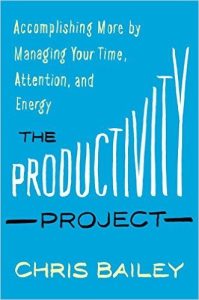 The Productivity Project: Accomplishing More by Managing Your Time, Attention,...
The Productivity Project: Accomplishing More by Managing Your Time, Attention,...
Bailey shares insights from his year-long experiment on productivity, focusing on managing time, attention, and energy. Key Points: Productivity is about managing your time, attention, and energy more effectively. Working with intention and purpose can make you more productive. Regularly assess and adjust your productivity strategies to fit...
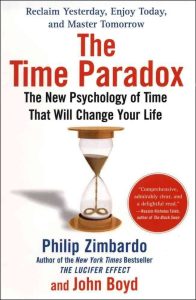 The Time Paradox: The New Psychology of Time That Will...
The Time Paradox: The New Psychology of Time That Will...
Extended In--Depth Summary: "The Time Paradox" is not a traditional time-management book. Instead, psychologists Zimbardo and Boyd delve into time from a psychological perspective. They explore how individuals' personal time perspectives—whether past, present, or future-oriented—shape their lives, their decisions, and their relationships. The book provides insights on how to shift...
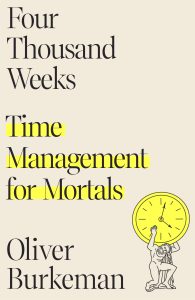 Time Management for Mortals: Making the Most of Life’s Minutes
Time Management for Mortals: Making the Most of Life’s Minutes
Extended In-Depth Summary: In "Time Management for Mortals," Burkeman takes a philosophical yet practical approach to the topic, acknowledging the finite nature of time and our mortal constraints. He discusses the psychological barriers that prevent us from using our time wisely and confronts the unattainable quest for the perfect productivity...
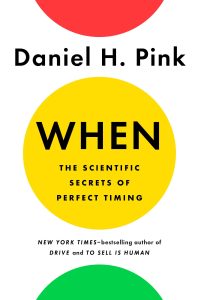 When: The Scientific Secrets of Perfect Timing
When: The Scientific Secrets of Perfect Timing
Extended In-Depth Summary: Daniel H. Pink's "When" explores the science of timing to reveal the hidden patterns in how we can use time to our advantage. Pink presents evidence from psychology, biology, and economics to uncover how timing impacts every aspect of our lives. From the best time of day...